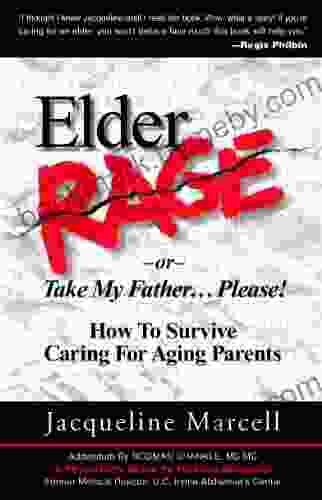Elder Rage: How to Survive Caring for Aging Parents

Caring for aging parents can be a rewarding experience, but it can also be challenging. As parents age, they may experience physical and cognitive decline, which can make it difficult for them to care for themselves. This can lead to feelings of frustration, anger, and resentment on the part of the caregiver.
4.4 out of 5
| Language | : | English |
| File size | : | 642 KB |
| Text-to-Speech | : | Enabled |
| Screen Reader | : | Supported |
| Enhanced typesetting | : | Enabled |
| Word Wise | : | Enabled |
| Print length | : | 368 pages |
| Lending | : | Enabled |
Elder rage is a term used to describe the extreme anger and hostility that some caregivers feel towards their aging parents. Elder rage can manifest itself in a variety of ways, including verbal abuse, physical abuse, and neglect.
There are a number of factors that can contribute to elder rage, including:
- The caregiver's own stress and anxiety
- The parent's difficult behavior
- The lack of support from other family members
- The caregiver's own personal history
If you are experiencing elder rage, it is important to seek help. There are a number of resources available to help caregivers, including:
- Support groups
- Counseling
- Respite care
- Medication
Caring for aging parents can be a difficult challenge, but it is important to remember that you are not alone. There are a number of resources available to help you cope with the challenges of caregiving. With the right support, you can provide your parents with the care they need while also protecting your own well-being.
Signs of Elder Rage
Elder rage can manifest itself in a variety of ways, including:
- Verbal abuse, such as yelling, swearing, or name-calling
- Physical abuse, such as hitting, pushing, or shoving
- Neglect, such as failing to provide food, water, or medication
- Financial exploitation, such as stealing money or property
- Emotional abuse, such as belittling, humiliating, or isolating
If you are experiencing any of these signs, it is important to seek help. Elder rage is a serious problem that can have devastating consequences for both the caregiver and the parent.
Causes of Elder Rage
There are a number of factors that can contribute to elder rage, including:
- The caregiver's own stress and anxiety
- The parent's difficult behavior
- The lack of support from other family members
- The caregiver's own personal history
The caregiver's own stress and anxiety can be a major trigger for elder rage. When caregivers are feeling overwhelmed and stressed, they may be more likely to lash out at their parents. This is especially true if the parent is exhibiting difficult behaviors, such as dementia or Alzheimer's disease.
The parent's difficult behavior can also be a major source of frustration for caregivers. Parents who are experiencing cognitive decline may be difficult to care for, and they may exhibit behaviors that are challenging and frustrating. This can lead to feelings of anger and resentment on the part of the caregiver.
The lack of support from other family members can also contribute to elder rage. When caregivers feel like they are alone in caring for their parents, they may be more likely to experience feelings of stress and anxiety. This can lead to elder rage if the caregiver feels like they cannot cope with the challenges of caregiving on their own.
The caregiver's own personal history can also be a risk factor for elder rage. People who have a history of trauma or abuse may be more likely to experience elder rage. This is because they may have difficulty coping with the stress and challenges of caregiving.
Treatment for Elder Rage
If you are experiencing elder rage, it is important to seek help. There are a number of treatments available to help you cope with the challenges of caregiving and reduce your anger. These treatments may include:
- Support groups
- Counseling
- Respite care
- Medication
Support groups can provide you with a safe and supportive environment to share your experiences and learn from others who are going through similar challenges. Counseling can help you to understand the root of your anger and develop coping mechanisms. Respite care can provide you with a break from caregiving, which can help to reduce your stress and anxiety.
Medication may also be prescribed to help you manage your anger. However, it is important to note that medication is not a cure for elder rage. It can only be used to manage the symptoms of the condition.
Prevention of Elder Rage
There are a number of things you can do to prevent elder rage from developing. These include:
- Taking care of your own mental health
- Getting support from other family members
- Learning about the aging process and the challenges of caregiving
- Developing coping mechanisms for dealing with difficult behaviors
- Seeking professional help if you are struggling to cope with the challenges of caregiving
Taking care of your own mental health is essential for preventing elder rage. When you are feeling stressed and overwhelmed, you are more likely to lash out at others. Make sure to get enough sleep, eat healthy foods, and exercise regularly. These things will help you to maintain your physical and mental health and reduce your risk of developing elder rage.
Getting support from other family members is also important. When you have a support system in place, you are less likely to feel alone and overwhelmed.
4.4 out of 5
| Language | : | English |
| File size | : | 642 KB |
| Text-to-Speech | : | Enabled |
| Screen Reader | : | Supported |
| Enhanced typesetting | : | Enabled |
| Word Wise | : | Enabled |
| Print length | : | 368 pages |
| Lending | : | Enabled |
Do you want to contribute by writing guest posts on this blog?
Please contact us and send us a resume of previous articles that you have written.
 Book
Book Novel
Novel Page
Page Chapter
Chapter Text
Text Story
Story Genre
Genre Reader
Reader Library
Library Paperback
Paperback E-book
E-book Magazine
Magazine Newspaper
Newspaper Paragraph
Paragraph Sentence
Sentence Bookmark
Bookmark Shelf
Shelf Glossary
Glossary Bibliography
Bibliography Foreword
Foreword Preface
Preface Synopsis
Synopsis Annotation
Annotation Footnote
Footnote Manuscript
Manuscript Scroll
Scroll Codex
Codex Tome
Tome Bestseller
Bestseller Classics
Classics Library card
Library card Narrative
Narrative Biography
Biography Autobiography
Autobiography Memoir
Memoir Reference
Reference Encyclopedia
Encyclopedia Melanie Murphy
Melanie Murphy Jacob T Schwartz
Jacob T Schwartz Pleasant Surprise
Pleasant Surprise Jennifer Harshman
Jennifer Harshman Scott Galloway
Scott Galloway Kim Hutchinson
Kim Hutchinson Piero Ferrucci
Piero Ferrucci Harvard Business Review
Harvard Business Review Luke Schumacher
Luke Schumacher Terri Tatchell
Terri Tatchell Jackie Glenn
Jackie Glenn Ralph L Block
Ralph L Block Jake Ryan
Jake Ryan Johanna Lehner
Johanna Lehner Natasha Preston
Natasha Preston N Kimball Ostrowski
N Kimball Ostrowski Teresa Giudice
Teresa Giudice Susan Kennedy
Susan Kennedy Saeed Yousef
Saeed Yousef Nick Estes
Nick Estes
Light bulbAdvertise smarter! Our strategic ad space ensures maximum exposure. Reserve your spot today!

 Charles BukowskiThe Four Nations Tournament: The Aegis of Merlin - A Fantasy Adventure for...
Charles BukowskiThe Four Nations Tournament: The Aegis of Merlin - A Fantasy Adventure for...
 Benjamin StoneUnveiling the Untold Story: An Insider Account of the Obama Administration's...
Benjamin StoneUnveiling the Untold Story: An Insider Account of the Obama Administration's... Henry Wadsworth LongfellowFollow ·2.8k
Henry Wadsworth LongfellowFollow ·2.8k Jessie CoxFollow ·18.3k
Jessie CoxFollow ·18.3k Marcel ProustFollow ·3.9k
Marcel ProustFollow ·3.9k Mark MitchellFollow ·5.2k
Mark MitchellFollow ·5.2k Jon ReedFollow ·17.4k
Jon ReedFollow ·17.4k Robert HeinleinFollow ·12.2k
Robert HeinleinFollow ·12.2k Nick TurnerFollow ·6.7k
Nick TurnerFollow ·6.7k Matt ReedFollow ·6.2k
Matt ReedFollow ·6.2k

 Phil Foster
Phil FosterThe Unforgettable Easter: Ramona's Journey of Discovery...
Embark on Ramona's Extraordinary Easter...

 Levi Powell
Levi PowellThe Old City and Mount of Olives: A Journey Through...
Jerusalem, a city etched into the annals of...

 Henry Hayes
Henry HayesThe Clearances: A Journey Through Scotland's Hidden...
In the 18th and 19th...

 Edward Reed
Edward ReedUnravel the Enigmatic 'Path of Bones' with Cassie Quinn...
Step into the...
4.4 out of 5
| Language | : | English |
| File size | : | 642 KB |
| Text-to-Speech | : | Enabled |
| Screen Reader | : | Supported |
| Enhanced typesetting | : | Enabled |
| Word Wise | : | Enabled |
| Print length | : | 368 pages |
| Lending | : | Enabled |












